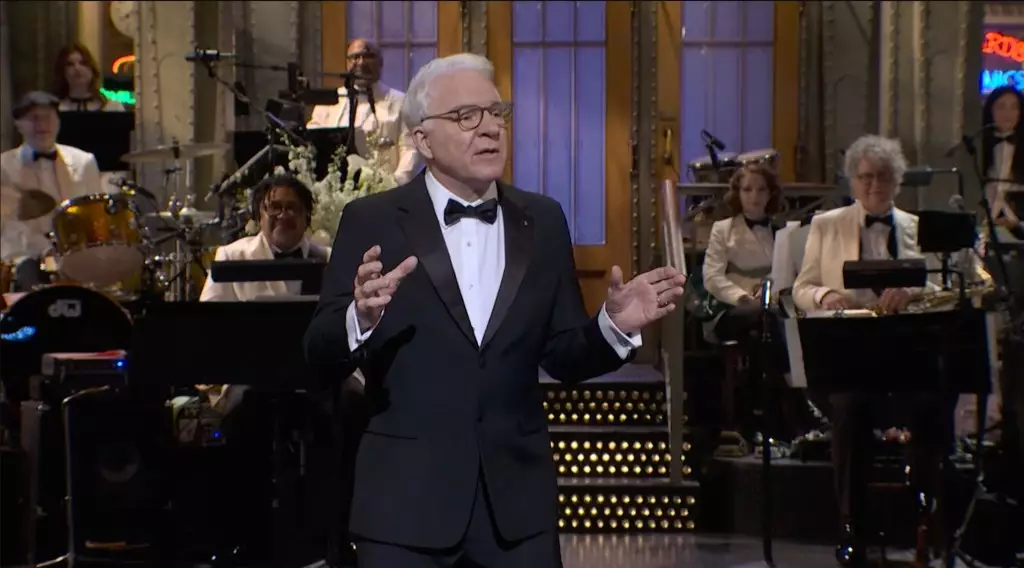In a world where late-night television reigns as a cultural cornerstone, few institutions hold as significant a place as “Saturday Night Live” (SNL). Its anniversary offers a rare opportunity to reflect on its legacy and the figures who have contributed to its success. Among these luminaries is Steve Martin, who recently reclaimed the record for most times hosting the show, tying Alec Baldwin at 17 appearances. Yet, with every humorous quip, Martin’s monologue carried weight far beyond mere jokes; it was a tapestry weaving together commentary on social issues, personal anecdotes, and reflections on the show’s storied history.
Martin’s opening line, “I’m Steve Martin, Saturday Night Live’s newest diversity hire,” was a bold and intentional choice, immediately rooting his performance in contemporary discussions surrounding diversity, equity, and inclusion (DEI) policies. With the political landscape shifting under the new Trump administration’s policies, which notably included a revision of earlier DEI efforts, this quip opened a dialogue about the evolving perception of diversity in show business. Martin’s ability to tie politics into his comedy showcased not only his wit but also his sharp awareness of the cultural backdrop against which he was performing. The interplay of humor and political commentary is vital in a media landscape ripe for scrutiny, and Martin’s approach illuminated the blurred lines between entertainment and social consciousness.
In a clever nod to the passage of time, Martin remarked on the age of SNL, claiming that “a person born during the first season of SNL could today be easily dead of natural causes.” This line ingeniously bridges humor with the bittersweet reality of aging, not just for the show but for its audience as well. The willingness to poke fun at the show’s legacy while also celebrating it is a testament to Martin’s understanding of both comedy as an art form and SNL as an institution. His self-aware humor laid the groundwork for a broader conversation about the show’s relevance in an ever-changing American cultural landscape.
One of the standout moments in Martin’s monologue was his tribute to the writers, asking them to “stand up and take a bow.” This gesture served as a reminder of the unsung heroes of SNL—the writers—who often toil in relative obscurity compared to their on-screen counterparts. By humorously highlighting this aspect, Martin not only honored their contributions but also invoked a sense of collective identity among all those involved in the show’s production. The ironic twist of stating the tribute was “written by AI” offered a playful commentary on the ever-encroaching technology in art and entertainment, implying that while AI could write jokes, it lacks the essential spark of human creativity.
The Bond of Friendship and the Essence of Comedy
The energy shifted when Martin was joined by John Mulaney, who brought his own unique brand of humor to the stage. Mulaney’s reflections on celebrity hosts encapsulated both admiration and frustration, reminding the audience that comedy often arises from complex relationships with those we idolize. “As I look around, I see some of the most difficult people I have ever met in my entire life,” he said, which elicits both laughter and contemplations about the nature of fame and interpersonal dynamics within the confines of a variety show. The camaraderie shared by Martin and Mulaney between jokes illustrates a vibrant tapestry of humor that transcends individual performances.
Steve Martin’s monologue during SNL’s 50th anniversary was not merely an opportunity to showcase his comedic skill; it was a multifaceted performance that explored themes of diversity, legacy, and creativity within the context of a revered television institution. From political commentary to heartfelt tributes, Martin’s mastery of the craft shone through, proving that comedy can serve as both entertainment and social critique. As we reflect on such performances, we are reminded that humor, at its best, can offer insights into the intricacies of our world, binding audiences in shared experiences while simultaneously challenging them to think critically about the issues we face. SNL, and all those who participate in it, will continue to be a battleground for both laughter and the exploration of societal truths.

